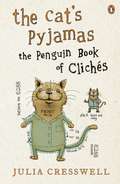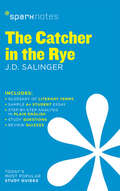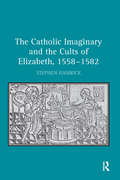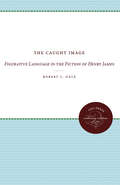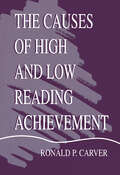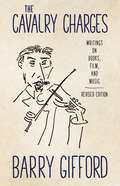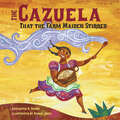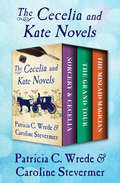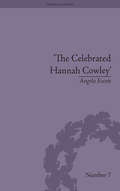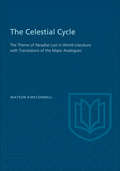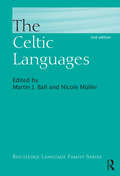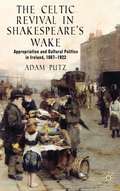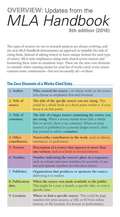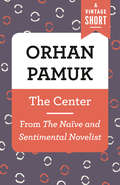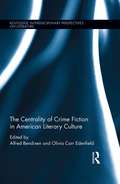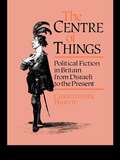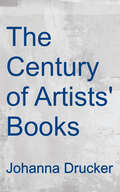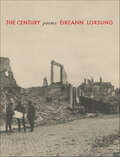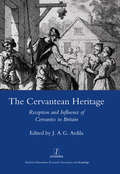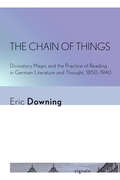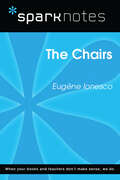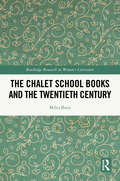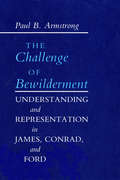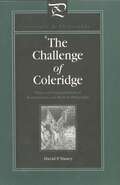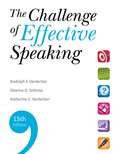- Table View
- List View
The Cat's Pyjamas: The Penguin Book of Clichés
by Julia CresswellA fascinating, thematic exploration of clichés from as the actress said to the bishop to zero hour, explaining what they are and where they’ve come from. Julia Cresswell has taken her best-selling dictionary of clichés (‘Sumptuous… A mine of information.’ Guardian) back to the drawing board and has created a book, packed with famous (and infamous) quotations and memorable information, that will change the way you see English.
The Catcher in the Rye SparkNotes Literature Guide (SparkNotes Literature Guide Series #21)
by SparkNotesThe Catcher in the Rye SparkNotes Literature Guide by J.D. Salinger Making the reading experience fun! When a paper is due, and dreaded exams loom, here's the lit-crit help students need to succeed! SparkNotes Literature Guides make studying smarter, better, and faster. They provide chapter-by-chapter analysis; explanations of key themes, motifs, and symbols; a review quiz; and essay topics. Lively and accessible, SparkNotes is perfect for late-night studying and paper writing. Includes:An A+ Essay—an actual literary essay written about the Spark-ed book—to show students how a paper should be written.16 pages devoted to writing a literary essay including: a glossary of literary termsStep-by-step tutoring on how to write a literary essayA feature on how not to plagiarize
The Catholic Imaginary and the Cults of Elizabeth, 1558–1582
by Stephen HamrickStephen Hamrick demonstrates how poets writing in the first part of Elizabeth I's reign proved instrumental in transferring Catholic worldviews and paradigms to the cults and early anti-cults of Elizabeth. Stephen Hamrick provides a detailed analysis of poets who used Petrarchan poetry to transform many forms of Catholic piety, ranging from confession and transubstantiation to sacred scriptures and liturgical singing, into a multivocal discourse used to fashion, refashion, and contest strategic political, religious, and courtly identities for the Queen and for other Court patrons. These poets, writers previously overlooked in many studies of Tudor culture, include Barnabe Googe, George Gascoigne, and Thomas Watson. Stephen Hamrick here shows that the nature of the religious reformations in Tudor England provided the necessary contexts required for Petrarchanism to achieve its cultural centrality and artistic complexity. This study makes a strong contribution to our understanding of the complex interaction among Catholicism, Petrachanism, and the second English Reformation.
The Caught Image: Figurative Language in the Fiction of Henry James
by Robert L. GaleGale considers the imagery in all of the 135 novels and short stories of Henry James and presents what may well be the first extensive treatment of figurative language in the complete works of any novelist. All of the images have been recorded, but the author does not claim too much for his deductions concerning them.Originally published in 1964.A UNC Press Enduring Edition -- UNC Press Enduring Editions use the latest in digital technology to make available again books from our distinguished backlist that were previously out of print. These editions are published unaltered from the original, and are presented in affordable paperback formats, bringing readers both historical and cultural value.
The Causes of High and Low Reading Achievement
by Ronald P. CarverThis book describes all of the important factors that cause some students to have low reading achievement and others to have high reading achievement. It concentrates on the main factors that influence how much a student gains in reading achievement during a year of school, or a calendar year. An attempt is made to answer the following questions: what can educators do to increase reading achievement, and what is beyond their influence? The author is directly concerned with achievement associated with normal or typical reading. The focus of the book is on things teachers can do during an entire school year that are likely to improve the reading level and reading rate of students, which in turn, will increase their reading achievement. This effort to specify the most important causes of high and low reading achievement represents an integration of two disciplines of scientific psychology--experimental psychology and psychometrics. A glossary at the end of the book contains definitions of terms and concepts. Helpful appendices explain rauding theory, the three laws of rauding theory, and the equations that can be used to predict the accuracy of reading comprehension, provide conversions among units of rauding rate, and list the numbered equations presented in the book.
The Cavalry Charges: Writings on Books, Film, and Music, Revised Edition
by Barry GiffordThe Cavalry Charges: Writings on Books, Film, and Music, Revised Edition is a collection of anecdotal reflections that relate many of the experiences that shaped Barry Gifford as a writer. Representative of Gifford’s body of work, this volume is divided into three sections: books, film and television, and music. Within these sections, Gifford’s best work is showcased, including a nine-part dossier on Marlon Brando’s One-Eyed Jacks in which Gifford examines the public and private lives of those involved in the film. New to the collection are four previously published essays: a brief look at the novels of Álvaro Mutis; a reflection on Gifford’s schooling under Nebraska poet John Neihardt; an essay on Elliot Chaze and his novel Black Wings Has My Angel; and a short piece on Sailor and Lula.
The Cazuela That the Farm Maiden Stirred
by Samantha R. VamosWINNER: Pura Belpré Illustrator Award Honor Book 2012&“A wonderful read-aloud, filled with merriment and conviviality&” — Kirkus Reviews, STARRED review&“The artistry of this book makes it a must buy for all libraries" — School Library Journal, STARRED reviewThis is the story of how the farm maiden and all the farm animals worked together to make the rice pudding that they serve at the fiesta. With the familiarity of "The House That Jack Built," this story bubbles and builds just like the ingredients of the arroz con leche that everyone enjoys. Cleverly incorporating Spanish words, adding a new one in place of the English word from the previous page, this book makes learning the language easy and fun. Rafael Lopez covers each page with vibrant, exuberant color, celebrating tradition and community. Back matter includes a glossary of Spanish words and a recipe for arroz con leche—perfect for everyone to make together and enjoy at story time.· Scholastic Reading Club Selection · Notable Social Studies Trade Book for Young People 2012 (NCSS) · Notable Children's Book in the Language Arts 2012 (NCTE) · NYPL&’s list of &“100 Titles for Reading and Sharing&” in 2011
The Cecelia and Kate Novels: Sorcery & Cecelia, The Grand Tour, and The Mislaid Magician (The Cecelia and Kate Novels #3)
by Patricia C. Wrede Caroline StevermerA trio of bewitching novels featuring devoted cousins who must juggle their magical powers with their duties as ladies in Regency-era England. Enter Regency-era England—and a world in which magical mayhem and high society go hand in hand—with three novels featuring cousins Cecelia and Kate. In Sorcery & Cecelia, the two cousins have been inseparable since girlhood. But in 1817, Kate goes to London to make her debut into English society, leaving Cecelia behind to fight boredom in her small country town. While visiting the Royal College of Wizards, Kate stumbles on a plot to destroy a beloved sorcerer—and only Cecelia can help her save him. In The Grand Tour, Cecelia and Kate, along with their husbands, are inaugurating married life with a trip to the Continent. When a mysterious woman in Calais gives Cecelia a package intended for Kate&’s mother-in-law, however, the two young wives realize they must spend their honeymoons preventing an emperor-in-exile named Napoleon from reclaiming the French crown. In The Mislaid Magician, it is 1828 and the cousins are now society matrons. The steam engine is announcing its arrival and the shaking of the locomotives begins to disrupt England&’s ancient, underground magical ley lines. When the disappearance of a foreign diplomat threatens to become an international incident, Cecelia departs to fight for the future of magic—leaving Kate to care for a gaggle of disobedient, spell-casting tots. Blending history, romance, and magic, these charming novels from the author of the Enchanted Forest Chronicles will delight anyone who loves Harry Potter or Susannah Clarke&’s Jonathan Strange & Mr Norell.
The Celebrated Hannah Cowley: Experiments in Dramatic Genre, 1776–1794 (Gender and Genre)
by Angela EscottHannah Cowley (1743–1809) was a very successful dramatist, and something of an eighteenth-century celebrity. New critical interest in the drama of this period has meant a resurgence of interest in Cowley’s writing and in the performance of her plays. This is the first substantial monograph study to examine Cowley’s life and work.
The Celestial Cycle: The Theme of Paradise Lost in World Literature with Translations of the Major Analogues
by Watson KirkconnellAn anthology of translated analogues, in whole or in part, on the theme of paradise lost. <P><P>The collection is divided into two parts. Part one is the analogues and part two is a descriptive catalogue of all the analogues the author consulted. <P>The book also includes a preface and lengthy introduction. It is an indispensable resource for any serious student or scholar of Milton's Paradise Lost.
The Celtic Languages: Readings In The Brythonic Languages, Festschrift For T. Arwyn Watkins (Routledge Language Family Series #68)
by Martin J. Ball Nicole MüllerThe Celtic Languages describes in depth all the Celtic languages from historical, structural and sociolinguistic perspectives with individual chapters on Irish, Scottish Gaelic, Manx, Welsh, Breton and Cornish. This second edition has been thoroughly revised to provide a comprehensive and up-to-date account of the modern Celtic languages and their current sociolinguistic status along with complete descriptions of the historical languages. This comprehensive volume is arranged in four parts. The first part offers a description of the typological aspects of the Celtic languages followed by a scene setting historical account of the emergence of these languages. Chapters devoted to Continental Celtic, Old and Middle Irish, and Old and Middle Welsh follow. Parts two and three are devoted to linguistic descriptions of the contemporary languages. Part two has chapters on Irish, Scots Gaelic and Manx, while Part three covers Welsh, Breton and Cornish. Part four is devoted to the sociolinguistic situation of the four contemporary Celtic languages and a final chapter describes the status of the two revived languages Cornish and Manx. With contributions from a variety of scholars of the highest reputation, The Celtic Languages continues to be an invaluable tool for both students and teachers of linguistics, especially those with an interest in typology, language universals and the unique sociolinguistic position which the Celtic languages occupy. Dr Martin J. Ball is Hawthorne-BoRSF Endowed Professor, and Director of the Hawthorne Research Center, at the University of Louisiana at Lafayette. Dr Ball has over 120 academic publications. Among his books are The Use of Welsh, Mutation in Welsh, and Welsh Phonetics. Dr Nicole Müller is Hawthorne-BoRSF Endowed Professor at the University of Louisiana at Lafayette. Among her books are Mutation in Welsh, and Agents in Early Irish and Early Welsh.
The Celtic Revival in Shakespeare’s Wake
by Adam PutzThis book reconsiders the Celtic Revival by examining appropriations of Shakespeare, using close readings of works by Arnold, Dowden, Yeats and Joyce to reveal the pernicious manner in which the discourse of Anglo-Irish cultural politics informed the critical paradigms that mediated the reading of Shakespeare in Ireland for a generation.
The Cengage Essential Reference Card to the MLA Handbook for Writers of Research Papers
by Karen Mauk Cengage Learning StaffThis card outlines the essential changes to the Modern Language Association's documentation style as described in the recently published 2016 MLA HANDBOOK, Eighth Edition.
The Center: From The Naïve and the Sentimental Novelist (A Vintage Short)
by Orhan PamukA Vintage Shorts selection. Taking us through his journey as a novelist and as a reader, Nobel Prize-winner Orhan Pamuk explores, with extraordinary insight, what constitutes what he calls “the center” of a work of fiction. Looking to works by writers as varied as Herman Melville and Virginia Woolf among many others, Pamuk examines the deeper reaches that emerge when we, as writers and readers, suspend our judgments and search for meaning inside the pages of a book, encouraging us all to do the same. An ebook short.
The Centrality of Crime Fiction in American Literary Culture (Routledge Interdisciplinary Perspectives on Literature)
by Alfred Bendixen Olivia Carr EdenfieldThis collection of essays by leading scholars insists on a larger recognition of the importance and diversity of crime fiction in U.S. literary traditions. Instead of presenting the genre as the property of Dashiell Hammett and Raymond Chandler, this book maps a larger territory which includes the domains of Mark Twain, F. Scott Fitzgerald, William Faulkner, Richard Wright, Flannery O’Connor, Cormac McCarthy and other masters of fiction.The essays in this collection pay detailed attention to both the genuine artistry and the cultural significance of crime fiction in the United States. It emphasizes American crime fiction’s inquiry into the nature of democratic society and its exploration of injustices based on race, class, and/or gender that are specifically located in the details of American experience.Each of these essays exists on its own terms as a significant contribution to scholarship, but when brought together, the collection becomes larger than the sum of its pieces in detailing the centrality of crime fiction to American literature. This is a crucial book for all students of American fiction as well as for those interested in the literary treatment of crime and detection, and also has broad appeal for classes in American popular culture and American modernism.
The Centre of Things: Political Fiction in Britain from Disraeli to the Present
by Christopher Harvie`This is an excellent survey of the British political novel.' - Contemporary Review
The Century Of Artists' Books
by Johanna DruckerNow Back in Print! Johanna Drucker's The Century of Artists' Books is the seminal full-length study of the development of artists' books as a twentieth-century art form. By situating artists' books within the context of mainstream developments in the visual arts, Drucker raises critical and theoretical issues as well as providing a historical overview of the medium. Within its pages, she explores more than two hundred individual books in relation to their structure, form, and conceptualization. This latest edition of the book features a new preface by Drucker and includes an introduction by New York Times senior art critic Holland Cotter.
The Century: Poems
by Éireann LorsungA meticulously detailed catalogue of ordinary people performing acts of extraordinary violence, The Century charts an awakening to structures of dominance and violence. In the tradition of witness poetry, The Century tugs apart the quotidian horrors required to perpetuate acts of violence like the Holocaust, the deployment of nuclear weapons in Japan and Iraq, American slavery and its lingering aftermath. When Éireann Lorsung writes of death and dying, of “bodies in the fields becoming the fields,” it’s the simplicity that’s most haunting. After a fire, “some of their skin moved off of them as they ran, a very / simple melting…” But these poems don’t just witness; they also resist and serve as models for resistant lives. Pushing back against form and grammar, constructions of time and geography, Lorsung traces decades of technological, geopolitical, and cultural shifts through generations and across continents as networks of dominance continue to be stubbornly upheld. The Century is evasive but thorny, splintering in the mind. This collection is a reminder that the arrival of each new century, decade, or year brings with it an invitation to join ongoing movements of resistance, air pockets of hope in the waters that we all swim or drown in.
The Cervanrean Heritage: Reception and Influence of Cervantes in Britain
by J. A. Ardila"Many critics regard Cervantes's Don Quixote as the most influential literary book on British literature. Indeed the impact on British authors was immense, as can be seen from 17th-century plays by Fletcher, Massinger and Beaumont, through the great 18th-century novels of Fielding, Smollett, Sterne, and Lennox, and on into more modern and contemporary novelists. 20th-century critics, fascinated by Cervantes, were moved to write what we now see as the classical works of Cervantes scholarship. Through their previous publications, the eminent contributors to this volume have helped to determine the reception of Cervantes in Britain. Together they now offer a comprehensive and innovative picture of this topic, discussing the English translations of Cervantes's works, the literary genres which developed under his shadow, and the best-known authors who consciously emulated him. Cervantes's influence upon British literature emerges as decidedly the deepest of any writer outside of English and, very possibly, of any writer since the Renaissance."
The Chain of Things: Divinatory Magic and the Practice of Reading in German Literature and Thought, 1850–1940 (Signale: Modern German Letters, Cultures, and Thought)
by Eric DowningIn The Chain of Things, Eric Downing shows how the connection between divinatory magic and reading shaped the experience of reading and aesthetics among nineteenth-century realists and modernist thinkers. He explores how writers, artists, and critics such as Gottfried Keller, Theodor Fontane, and Walter Benjamin drew on the ancient practice of divination, connecting the Greek idea of sympathetic magic to the German aesthetic concept of the attunement of mood and atmosphere.Downing deftly traces the genealogical connection between reading and art in classical antiquity, nineteenth-century realism, and modernism, attending to the ways in which the modern re-enchantment of the world—both in nature and human society—consciously engaged ancient practices that aimed at preternatural prediction. Of particular significance to the argument presented in The Chain of Things is how the future figured into the reading of texts during this period, a time when the future as a narrative determinant or article of historical faith was losing its force. Elaborating a new theory of magic as a critical tool, Downing secures crucial links between the governing notions of time, world, the "real," and art.
The Chairs (SparkNotes Literature Guide Series)
by SparkNotesThe Chairs (SparkNotes Literature Guide) by Eugene Ionesco Making the reading experience fun! Created by Harvard students for students everywhere, SparkNotes is a new breed of study guide: smarter, better, faster.Geared to what today's students need to know, SparkNotes provides:chapter-by-chapter analysis explanations of key themes, motifs, and symbols a review quiz and essay topicsLively and accessible, these guides are perfect for late-night studying and writing papers.
The Chalet School Books and the Twentieth Century (Routledge Research in Women's Literature)
by Miles BooyThe first full-length study of this beloved children’s series, The Chalet School in the Twentieth Century moves beyond the largely generic analysis within which it has previously been discussed. Published between 1925 and 1970, the series moves from European reconciliation after the Great War, through a second global conflict to a post-war world increasingly defined by increased secularity and emerging consumerism. Reproducing cover illustrations, Miles Booy’s book examines both those issues which author Elinor M. Brent-Dyer consciously explored (such as the exceptional The Chalet School in Exile, which she sought to explain the Nazi occupation of Austria to her young readers) and those aspects of the text which must be read symptomatically. This is a book which will engage students with historical and cultural interests beyond children’s literature. With barely a midnight feast in sight, but much anxiety about social change, it’s a familiar genre, but not as you think you know it. Hurry up, new girls, class is about to begin...
The Challenge of Bewilderment: Understanding and Representation in James, Conrad, and Ford
by Paul B. ArmstrongThe Challenge of Bewilderment treats the epistemology of representation in major works by Henry James, Joseph Conrad, and Ford Madox Ford, attempting to explain how the novel turned away from its traditional concern with realistic representation and toward self-consciousness about the relation between knowing and narration. Paul B. Armstrong here addresses the pivotal thematic experience of "bewilderment," an experience that challenges the reader’s very sense of reality and that shows it to have no more certainty or stability than an interpretative construct. Through readings of The Sacred Fount and The Ambassadors by James, Lord Jim and Nostromo by Conrad, and The Good Soldier and Parade’s End by Ford, Armstrong examines how each writer dramatizes his understanding of the act of knowing. Armstrong demonstrates how the novelists’ attitudes toward the process of knowing inform experiments with representation, through which they thematize the relation between the understanding of a fictional world and everyday habits of perception. Finally, he considers how these experiments with the strategies of narration produce a heightened awareness of the process of interpretation.
The Challenge of Coleridge: Ethics and Interpretation in Romanticism and Modern Philosophy (Literature and Philosophy)
by David HaneyInterweaving past and present texts, The Challenge of Coleridge engages the British Romantic poet, critic, and philosopher Samuel Taylor Coleridge in a "conversation" (in Hans-Georg Gadamer’s sense) with philosophical thinkers today who share his interest in the relationship of interpretation to ethics and whose ideas can be both illuminated and challenged by Coleridge’s insights into and struggles with this relationship.In his philosophy, poetry, theology, and personal life, Coleridge revealed his concern with this issue, as it manifests itself in the relation between technical and ethical discourse, between fact and value, between self and other, and in the ethical function of aesthetic experience and the role of love in interpretation and ethical action.Relying on Gadamer’s hermeneutics to supply a framework for his approach, Haney connects Coleridge’s ideas with, among others, Emmanuel Levinas’s other-oriented notion of ethical subjectivity, Paul Ricoeur’s view about the other’s implication in the self, reinterpretations of Greek drama by Bernard Williams and Martha Nussbaum, and Gianni Vattimo's post-Nietzschean hermeneutics.Coleridge is treated not as a product of Romantic ideology to be deconstructed from a modern perspective, but as a writer who offers a "challenge" to our modern tendency to compartmentalize interpretive issues as a concern for literary theorists and ethical issues as a concern for philosophers. Looking at the two together, Haney shows through his reading of Coleridge, can enrich our understanding of both.
The Challenge of Effective Speaking
by Rudolph F. Verderber Kathleen S. Verderber Deanna D. SellnowDo you want to ace your public speaking course? All you need to know, including all of the skills that will help you become a confident speaker and conquer speaking anxiety, are thoroughly covered in THE CHALLENGE OF EFFECTIVE SPEAKING, 15e. A favorite with students, this best seller guides you through six key "Speech Planning Action Steps". The result? You'll learn how to prepare and deliver strong speeches that get you good grades in your public speaking course! You'll be guided through topic selection, audience analysis and adaptation, effective research (including appropriate use of Internet resources), organization (with an emphasis on outlining), and language and delivery. The new 15th edition of this nationwide best seller also including many online tools, including videos of actual student speeches accompanied by Interactive Video Activities that help you develop and strengthen your public speaking skills. Authors Rudy and Kathie Verderber, together with new coauthor Deanna D. Sellnow, have grounded this new edition with the latest research to give you an exceptional resource for creating and delivering your speeches.
